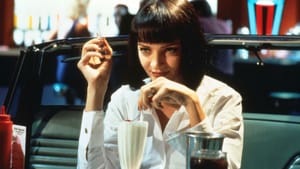Stay in the Loop
BSR publishes on a weekly schedule, with an email newsletter every Wednesday and Thursday morning. There’s no paywall, and subscribing is always free.
Oh, I'm sorry—did I break your concentration?
A Philly screening celebrates 25 years for Quentin Tarantino’s ‘Pulp Fiction’

Pulp Fiction, more than anything else, was the movie that got me into movies.
I'd always loved movies growing up, but Pulp Fiction, which is showing Wednesday, June 19, in 35mm at the Philadelphia Film Center, taught my 16-year-old self the possibilities of what movies could do and be. It's the film, more than any other, that set me on the path of thinking deeply about cinema and ultimately to a career as a film and culture critic.
It was funny, it was exciting, and perhaps more than anything, it acted as an anthology of dozens of references to earlier cinema. Tarantino, the legend goes, gave himself a film-school-level education by working in a video store and binging the store's entire collection. During one summer in college I, like many others of my generation, attempted a similar undertaking.
An auspicious premiere
Tarantino's second full-length feature premiered at the Cannes Film Festival on May 21, 1994—and won the Palme d'Or ahead of its theatrical release that October. The film chronicles a series of interconnected stories in the Los Angeles underworld, concerning a pair of hitmen (John Travolta and Samuel L. Jackson), an aging boxer (Bruce Willis), a crime boss (Ving Rhames), that boss's wife (Uma Thurman), and an English couple who decide on a whim to rob a restaurant (Tim Roth and Amanda Plummer).
Arriving two years after his debut Reservoir Dogs, Pulp Fiction made Tarantino a household name, while resurrecting the career of Travolta and pushing the likes of Jackson, Thurman, and Rhames to new heights of stardom. Christopher Walken had been working in films since the early '70s and even won an Oscar for The Deer Hunter in 1979, but his status as a cult figure of the '90s and aughts can be traced back to his single scene in Pulp Fiction, along with his similarly brief turn in the Tarantino-written True Romance two years earlier.
Cue the ripoffs
Pulp Fiction is one of those films you watch a generation later, like Die Hard and Fatal Attraction, and realize just how much it was ripped off in the ensuing years. As in Reservoir Dogs before it, hardened criminals argue about stuff like the sexual significance of a foot massage, and what they call a Quarter Pounder with Cheese in Europe.
The ensuing decade was full of movies that payed homage to Pulp Fiction in ways large and small, like 2 Days in the Valley and Things to Do In Denver When You're Dead. Tarantino himself made cameo appearances in several of them.
But there was much more to the movie's appeal. It's a 153-minute film with the momentum of a rocket engine. Its plot unfolds in nonlinear order, with no one particular protagonist. It’s a visually stunning film; the Jack Rabbit Slim's sequence alone is both a thing of physical beauty and a masterpiece of production design.
The film also arrived right around the same time as widespread consumer adoption of the Internet, just in time for fans of Pulp Fiction to argue about the meaning of the glowing briefcase and other elements that Tarantino purposely left mysterious.
Never said it better
And then there's that great dialogue. The Huffington Post assembled a supercut of Jackson saying “motherfucker” 171 times across 29 movies, and that was two years ago. But he never said it better than in Pulp Fiction, the only time he ever used his favorite swear word twice in one sentence. In 2018, Jackson’s dialogue surfaced yet again in a viral mashup of Pulp Fiction and a certain infamous congressional hearing.
Pulp Fiction was a sizable hit, elevating the character of just about everyone in it. It was nominated for seven Oscars, and Tarantino and cowriter Roger Avary won for Best Original Screenplay. Tarantino soon emerged as a ubiquitous celebrity, hosting Saturday Night Live and becoming a talk-show fixture.
Pulp Fiction today
Sure, there are various things about Pulp Fiction that give one pause today, and the first of those is the screenplay's frequent, casual use of racist slurs, especially by characters who are supposed to be sympathetic.
The movie uses a brutal rape (of a male character, Marcellus Wallace) as a vehicle for revenge and redemption. And of course, Harvey Weinstein's name is on the film as a producer, and we know now that Uma Thurman has accused Tarantino himself of responsibility for dangerous conditions on the set of Kill Bill Vol. 2.
Aside from stuff that's problematic, certain scenes—such as everything with Bruce Willis and his girlfriend—drag on forever without going anywhere in particular, which would become a theme of Tarantino's later work.
But Pulp Fiction, like other movies, was made in the context of its time. We can acknowledge its problematic elements, as well as how the world has evolved since its release.
So I wish a happy 25 years to my pumpkin, my honeybunny, and the film that taught me more than any other.
If you miss the June 19 screening, Pulp Fiction is streaming on Netflix.
What, When, Where
Pulp Fiction. Directed by Quentin Tarantino, written by Tarantino and Roger Avary. Screening on Wednesday, June 19, 2019, at 7pm at the Philadelphia Film Center, 1412 Chestnut Street, Philadelphia. This event features 30 minutes of live music prior to the film. Tickets available online.
The Philadelphia Film Center is a wheelchair-accessible venue. Visit online for more info.
Sign up for our newsletter
All of the week's new articles, all in one place. Sign up for the free weekly BSR newsletters, and don't miss a conversation.

 Stephen Silver
Stephen Silver